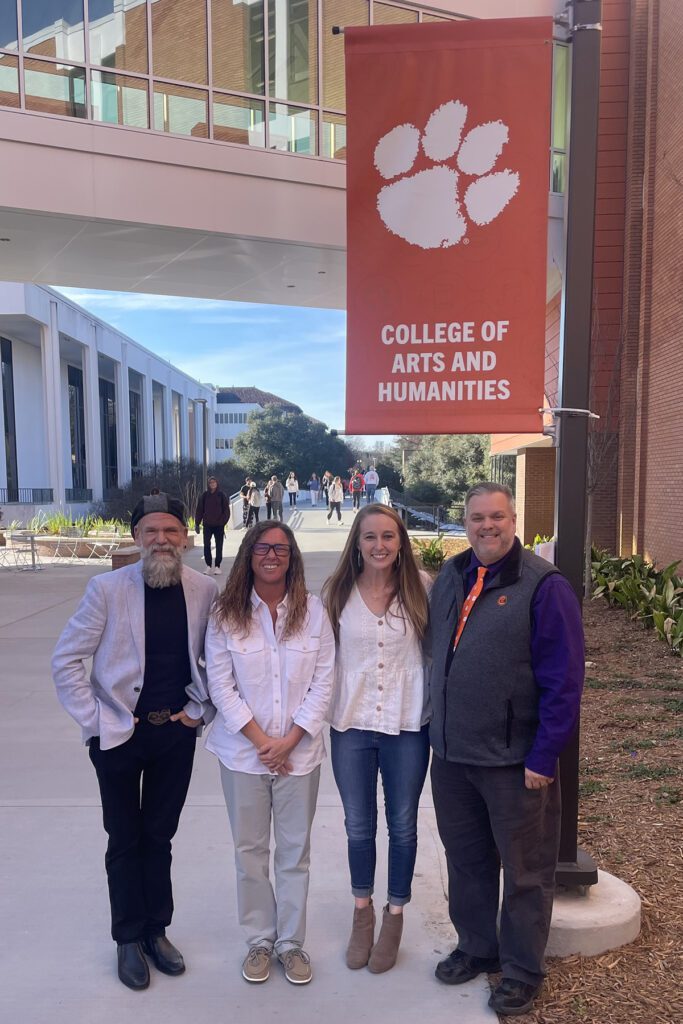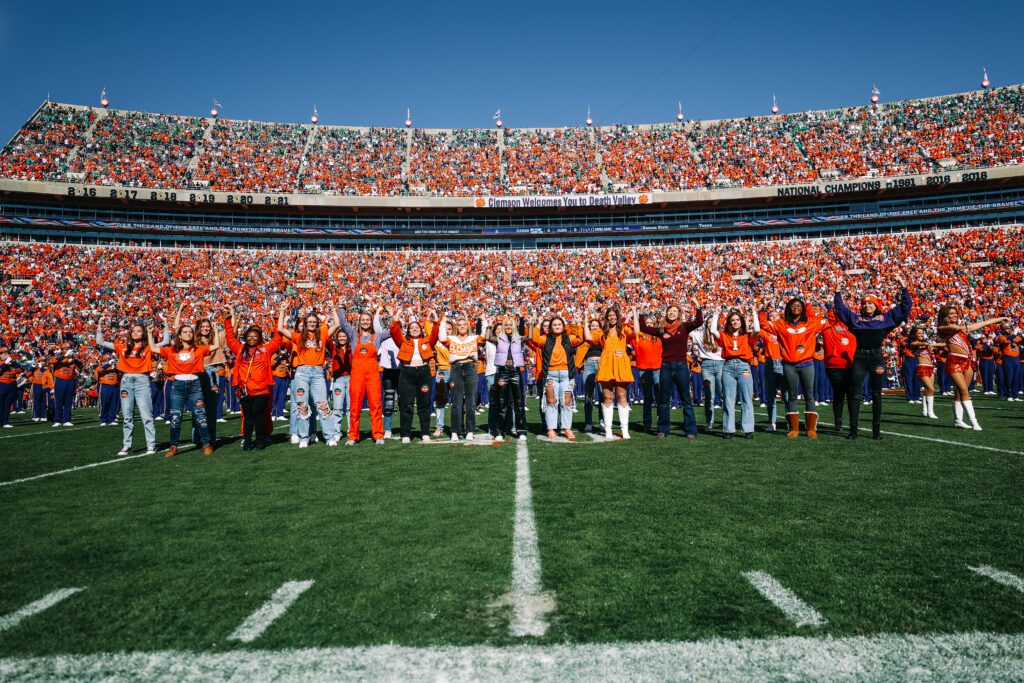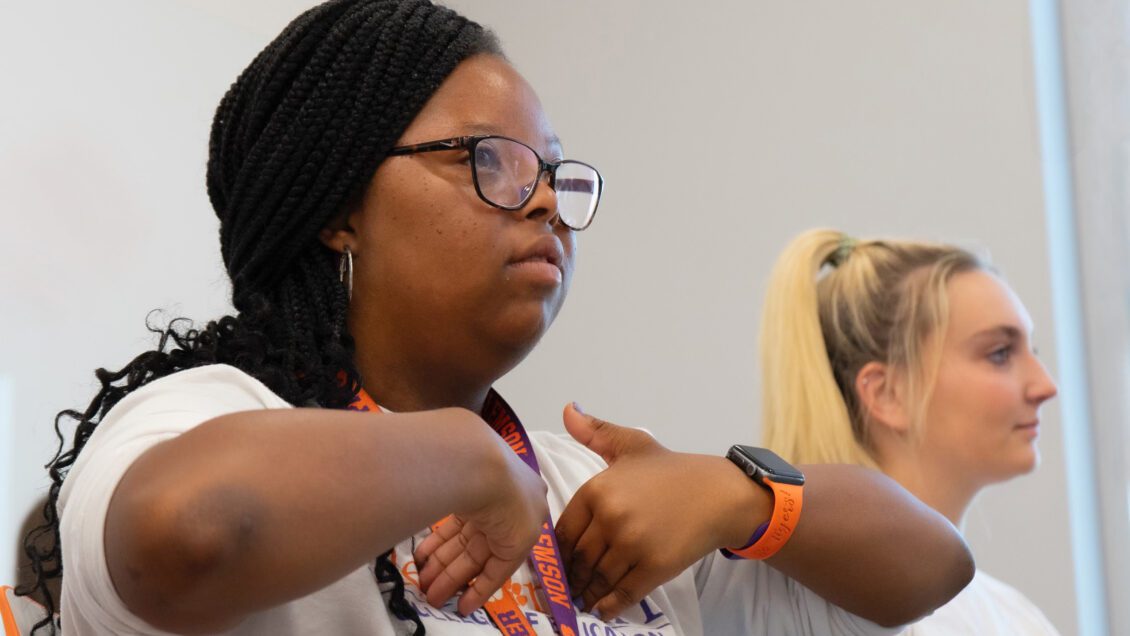Taylor Freeman made history last fall as the first Clemson University student with Down syndrome to complete an American Sign Language (ASL) course, defying limitations.
Her path to enrolling in lecturer Tasha Goodrich’s class united multiple members of the Clemson Family, each encouraging her to learn a new and expressive way to communicate.
A junior with ClemsonLIFE, Freeman is in the post-secondary education program for students with intellectual disabilities that prioritizes job skills and independent living. She learned from a distinguished group of professors as Clemson is one of only 172 four-year institutions that fully recognize ASL as a unique and complex language.
“I loved it,” Freeman said of the experience. “Having the students and volunteers help me made me very happy. This class felt like my family. I always wanted to take this class from the moment I was accepted into the ClemsonLIFE program.”
A partnership forms
LIFE volunteer Sydney Standifer and Freeman’s Sigma Kappa sorority sister Egan Conrad invited Goodrich to the annual spring ClemsonLIFE talent show. Conrad, an ASL club officer, worked with Freeman to perform a song in ASL at the show.
“It’s been awesome to see her fall in love with the language and learn to communicate with others,” Conrad said. “It’s made our relationship closer. We’re constantly practicing with one another to keep up with our skills outside of class. This has been a highlight of my time at Clemson.”

A connection formed between Goodrich, Freeman’s family and Courtney Dukes ‘15 that night. It’s one Standifer said she was grateful to help forge.
“If it’s not for them, none of this happens,” Goodrich said. “I’ve been teaching for 19 years and this has inspired me. I continue to be in awe of Taylor’s potential and talents. She did this on her own and was a great student.”
“I’m so thrilled that I’m able to experience Taylor’s success along with so many others,” Standifer added.
A meeting afterward between Goodrich, Standifer and fellow ASL lecturers Bo Clements and Anthony Fattibene had one objective: how can we form an inclusive partnership between the department and ClemsonLIFE? The group believed the initiative would have institutional support, partly because of President Jim Clements’ longstanding affinity for ClemsonLIFE.
It was agreed that Freeman wouldn’t take quizzes or exams but expected to complete homework assignments and attend all classes and events hosted on campus.
Heavily involved in the collaborative effort was Dukes, a Clemson graduate who minored in ASL and works with first-year ClemsonLIFE students.
“Taylor’s a very sweet girl,” she said. “I always felt signing was a little pocket of my life that didn’t intersect with other areas. It’s been cool to see one of my students do something I really love. It’s been good for me to see one of my students excel in something I love, too.”
Moving forward
With a solid web of support weaved by professors, volunteers and her classmates, Freeman thrived in the classroom, which included students Grayson Yerich and Caroline Chamness. Chamness is a fellow sorority sister who sat next to Freeman in class. Yerich said Freeman grew noticeably confident in signing. Fattibene, who hadn’t taught Freeman, called her a natural with the language.
“I really enjoyed walking into class and seeing her smile,” Chamness said. “She is such a sweet person with a big heart and an amazing personality.”
“I can’t wait to see what else Taylor does in the future,” Yerich added. “With her positive attitude and work ethic, I know she will continue to flourish in all she does.”
The Fall semester was full of events to participate in, including a unique opportunity to sign the national anthem in Memorial Stadium with the ASL club before the Tigers upset Notre Dame in early November.

And, of course, Freeman’s family is proud she paved the way for classmates and others with disabilities. Her mom, Ayoca Freeman, said Taylor has never shied away from trying something new. With the Spring semester here, Taylor will continue to be a member of the ASL club.
“I am proud to call her my daughter and I thank God for using her life to show others that there are abilities in disabilities,” Ayoca said.
Clemson News thanks Alton Brant and Courtney Dukes for their interpretation during interviews, which made this story possible.
Get in touch and we will connect you with the author or another expert.
Or email us at news@clemson.edu

